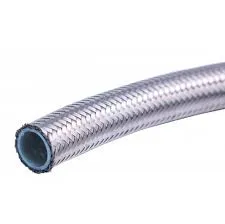Nov . 06, 2024 06:41 Back to list
CE Certification for R1 and R2 Hydraulic Hose Products Compliance and Standards
CE Certification for R1/R2 Hydraulic Hose Products
In the realm of industrial applications, hydraulic hoses are vital components that ensure effective transmission of hydraulic energy. Among the many standards that govern the manufacturing and quality assurance of hydraulic hoses, the CE certification for R1 and R2 hydraulic hose products stands out as a crucial benchmark for safety and performance.
Understanding CE Certification
The CE mark, which stands for Conformité Européenne, signifies that a product meets the essential health, safety, and environmental protection requirements set by European Union legislation. For hydraulic hoses, this certification indicates that the products conform to rigorous performance standards, making them suitable for use in demanding industrial environments.
The R1 and R2 Hydraulic Hoses
Hydraulic hoses R1 and R2 are widely recognized for their reliability and flexibility. R1 hoses are single wire braided hoses, while R2 hoses feature two wire braids, enhancing their strength and pressure handling capabilities. Both types are designed to carry hydraulic fluids under high pressure, making them indispensable in various applications, including construction, manufacturing, and agricultural machinery.
The Importance of CE Certification for R1/R2 Hoses
ce certification r1/r2 hydraulic hose products

1. Safety Assurance The primary reason for seeking CE certification is safety. Hydraulic systems operate under high pressure, and any failure in the hose can lead to catastrophic consequences, including equipment failure, injury, and environmental hazards. CE certification ensures that R1 and R2 hoses have undergone rigorous testing to withstand specified pressure levels and mechanical stresses.
2. Market Access For manufacturers, obtaining CE certification is often a prerequisite for entering the European market. It serves as proof of compliance with EU regulations, allowing businesses to market their products more effectively across Europe. The CE mark can enhance a product’s competitiveness, as it establishes trust in quality and safety among consumers and industry professionals.
3. Quality Assurance CE certification requires extensive documentation and quality control throughout the manufacturing process. This means that manufacturers must implement stringent quality assurance measures, ensuring that every hose produced meets the established standards. As a result, customers can confidently choose CE-certified R1 and R2 hoses, knowing they are purchasing high-quality, reliable products.
4. Environmental Compliance The CE certification process also includes considerations for environmental impact. Manufacturers are encouraged to adopt eco-friendly practices, thus contributing to reducing waste and promoting sustainable production methods. This aligns with the growing emphasis on corporate responsibility and environmental stewardship in today’s industrial landscape.
Conclusion
In summary, CE certification for R1 and R2 hydraulic hose products is not just a legal requirement; it is a critical assurance of safety, quality, and environmental responsibility. For manufacturers, achieving this certification demonstrates a commitment to producing dependable and efficient products that meet both market demands and regulatory standards. For consumers and industry stakeholders, the CE mark on hydraulic hoses serves as a guarantee of quality, helping to mitigate risks associated with high-pressure hydraulic systems. As industries continue to evolve, the importance of such certifications will only grow, ensuring that safety and quality remain at the forefront of hydraulic technology.
-
Best Four Steel Wire Spiral Hose Hydraulic R12 – Durable High-Pressure Hose Manufacturer
NewsJul.08,2025
-
High-Quality 1/4 Hydraulic Hose – Soft, Flexible & Durable Rubber Hoses for Industrial Use
NewsJul.08,2025
-
1 1 2 Inch Hydraulic Flexible Hose - Durable, Reliable, High-Pressure Solutions
NewsJul.07,2025
-
High-Quality 1 2 Rubber Hose - Durable, Flexible Hydraulic Solutions
NewsJul.07,2025
-
Discover SAE Hydraulic Hose Types - High Quality & Durable Hoses from Leading Factory Supplier
NewsJul.06,2025
-
High Pressure Wire Hydraulic Rubber Hose Supplier Durable & Reliable 1SN Hose Solutions
NewsJul.06,2025
